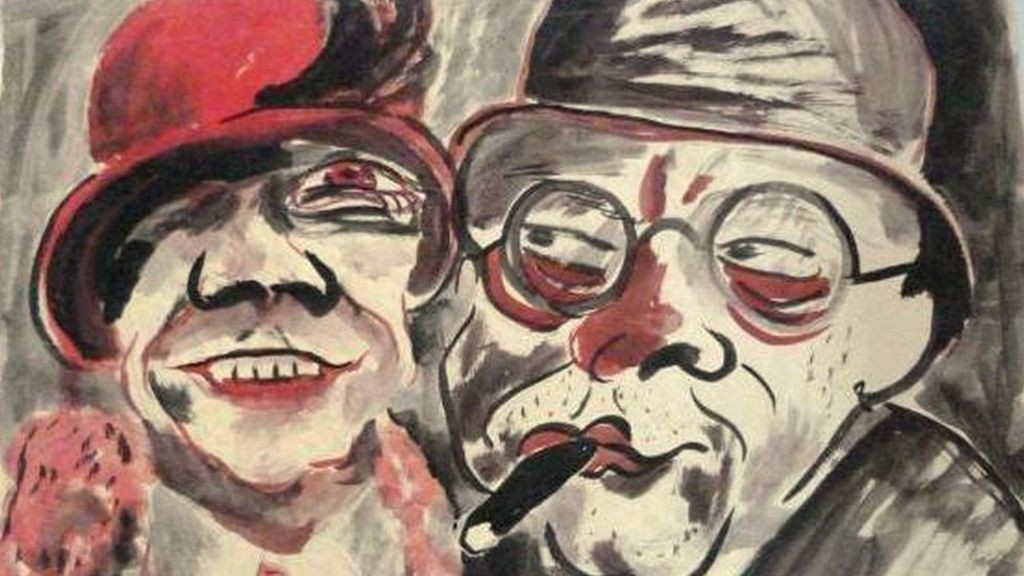“I realized the voices arose from something far more sinister than mere thoughts.” A short story where perceived inanimate objects possess more influence than one could ever imagine…

by: Teresa Renton
I bought four deckchairs. All of them bright, covered in colorful stripes, but each different from the others. Yet it was obvious they were a set, like four sisters posing for a photo. The elderly lady who sold me the chairs whispered, “Look after them and they will bring sparkle to your life.” I thought this odd, but couldn’t resist, even though I lived nowhere near any beaches.
The shed housed the deckchairs for a few days until the sun performed a spectacular sunset show one evening. I grabbed the top chair — thick peach, blue, and white stripes — then changed my mind and swapped it for the navy and yellow one. I watched the sun melt across the sky, stretching crimson and gold tentacles through the clouds, glass of pinot in one hand, tissue to dab my eyes in the other. Ninety-nine days now, and still drinking alone.
Without warning, my wine-induced stability gave rise to a churning stomach, and that’s when I first experienced a ‘“voice” — a thought that felt thrust upon me. Get up. I heard the unequivocal instruction in my head. Text Paul and tell him to get the rest of his shit out of your apartment. “Yes,” I yelled, the wine boosted my resolve, and I punched a message on my phone: ‘If you don’t shift your shit, I’ll burn it all’.
So I did. Then I observed the fragile ashes drifting up like fragments of lace to find the night stars.
The next evening, after work, I selected the chair that I wanted to sit in, blue and green stripes. As I sat in it, another voice told me to resume my part-time master’s degree in Business Finance. It had become something I said I was doing, rather than something I did, since Paul left. Now it was time to choose success or grow into a lonely old cat-lady. I chose to fill the empty Paul-shaped cavities with economic theories and financial models and build my towers.
I can’t say what compelled me to sit in the deckchairs every day. Maybe it was the nostalgic feel of the canvas as it suspended me, and filled my mouth with memories of candy-floss, my eyes with shell-embossed sandcastles, and my ears with distant ripples of a retreating sea. But I liked that I didn’t cry anymore. I liked the solutions that descended on me like a renaissance — answers to work-related issues, where to invest, what to wear on a date, how to even get a date. But persistently, unsolicited advice crept in, a slow, dry rot contaminating the newfound clarity I now enjoyed.
She passed your work off as her own and took your promotion. You should sleep with her fiancé, you know you can.
So I did.
You deserve that designer dress. Just steal it. You’d look fabulous in it.
So I did.
I looked at the changes I’d made, my newly furnished apartment reflected the beautiful person I’d become: designer labels dripped from padded satin hangers, invitations graced the cold, marble mantlepiece, regular sessions with a gorgeous personal trainer. The deckchairs eventually lived in a roomy cupboard off of the entrance hall because every time I lifted them out to the shed, they reappeared in the cupboard. I accepted this in the same way people accept their keys aren’t always where they left them, or when their partner leaves a receipt lying around for some Chanel No5 that they never received. I realized the voices arose from something far more sinister than mere thoughts.
Once, the chairs advised me what I should take to feel less stressed. “No way!” I objected. I didn’t want to wind up horizontal in some alley littered with condoms and the sleeping shells of people. Yet, to emphasize their point, the deckchairs became magnets, their force pulling me to the wildest colored red and black one. And when I fought to escape, it burned hot until my back turned red and still it wouldn’t let me stand. Droplets of sweat appeared on my forehead as I wriggled and my heartbeat increased its pace. That’s when I knew I no longer belonged to myself. I was like those shells in some alley already. Except my alley was lined in sleek silk and scented with jasmine — and I knew it could all vanish. It’s your choice!
“Okay!” I screamed. “Okay!”
This was all wrong. I should have stopped things immediately, sold the chairs or given them away. Burned them even. I deliberated on what to do. The threat of the deckchairs lingered, and I didn’t want to lose my dinner invitations, recognition, and business awards. In truth, I didn’t want to relinquish visibility. Plus, I still had unfinished business to attend to. I sat down in the red and black chair again, stroked the wooden frame with my fingers, and surrendered by falling into a deep sleep. I’d made my decision, and we now had an understanding.
Cocktails of mind-altering substances kept me awake, sent me to sleep, made me wild, and propelled me forward with a blinding force in my career and my social life. When I sat in my deckchairs, I did everything that occurred to me.
You’ll get away with this if you pass the work off as your own.
Just log into her account to get the information you need.
He won’t be able to resist you, then you’ve got him!
Tamper with his presentation, he’ll look incompetent.
Then don’t forget to send a message of support.
What more could I desire? I had everything, and I had nothing. But that was the unspoken pact between us. My compliance for superficial gratification. I accepted that I would be like an actor, playing myself in my life story. In time, Paul got in touch. He’d heard about my success and seen my picture in the paper. Could he drop by and perhaps catch up? Let him.
So I did.
I invited him to sit in the red and black striped deckchair, then I wandered into the garden, rolled a joint, and poured a glass of pinot.
Teresa Renton has a first-class degree in English Linguistics and Language Creativity from the Open University. Her work has previously been published or is forthcoming in Stick Figure Poetry, 101 Words, and 50 Give or Take, Vine Leaves Press. Some of her other work can be found online at Vocal Media where she has won prizes for her poetry and short fiction.





